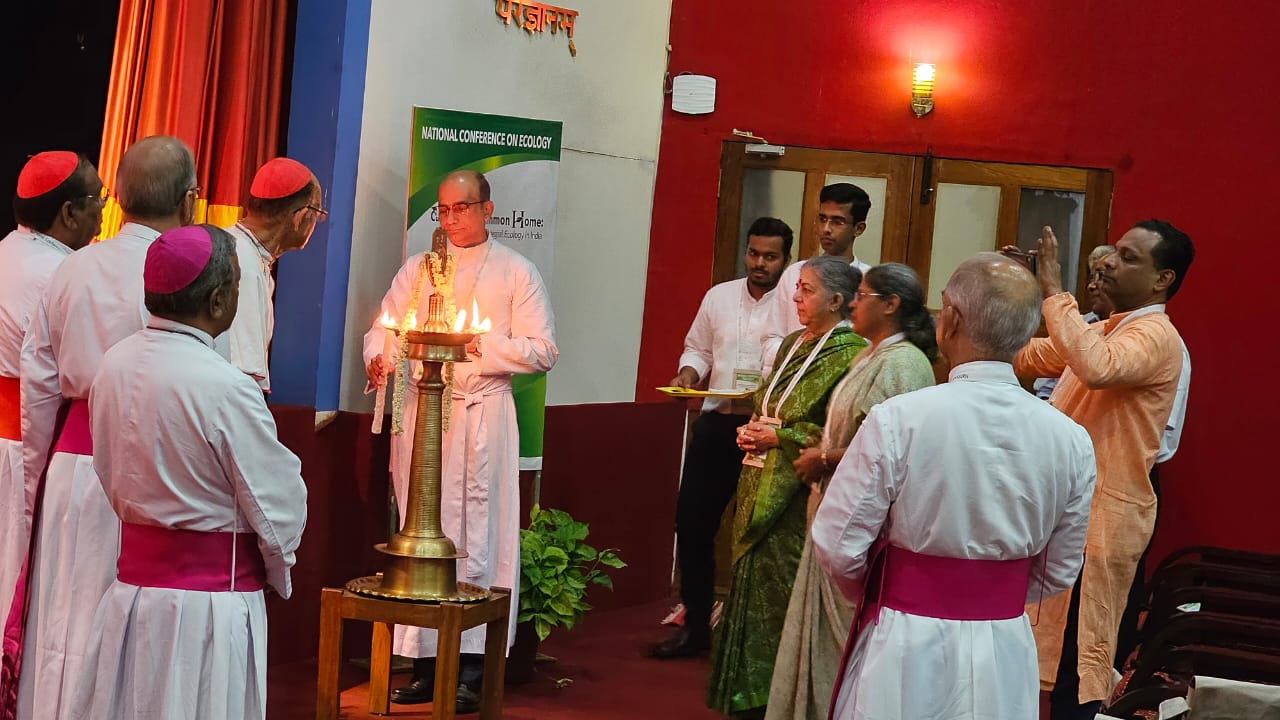Cardinal Poola: the environmental crisis comes from the heart of humans
A seminar on the perspective of integral ecology in India is currently taking place in Bengaluru under the auspices of Catholic bishops. In his introductory address, the Archbishop of Hyderabad said: “Integral ecological care is not just a concept; it is a living expression of our love for God and our love for our neighbours, both near and far.”
Bengaluru (AsiaNews) – A three-day national conference on the environment is currently underway (21-23 November) at Dharmaram Vidya Kshetram (DVK), Bengaluru.
Organised by the Catholic Bishops' Conference of India (CBCI) and the Conference of Catholic Bishops of India-Latin Rite (CCBI), the meeting is centred on "Care for our common home, towards an integral ecology in India".
Its aim is to understand the current situation of the environment in India, the government's response, and the actions the Church and other religions can take to protect our common home.
We publish large excerpts from the introductory address made by Card Anthony Poola, Archbishop of Hyderabad.
Integral ecological care, as expressed in Pope Francis’s encyclical “Laudato Si’,” is a call to action that underscores the interconnectedness of all life on Earth. In Catholic teachings, it is rooted in several key principles that guide our response to the environmental challenges we face today.
1. Creation as a Gift: Our faith teaches us that the Earth is a precious gift from God. In the Book of Genesis, we read about God creating the world and declaring it good. We are entrusted with the care of this gift, a sacred responsibility.
2. Stewardship: We are called to be stewards of God’s creation, not owners. Our role is to protect and preserve the environment, recognizing that we are accountable to God for how we manage the resources entrusted to us.
3. The Common Good: Catholic social doctrine emphasizes the common good, which extends to the environment. A healthy planet is essential for the well-being of all, and it is our moral duty to safeguard it for the benefit of present and future generations.
4. Solidarity and Care for the Poor: Integral Ecological Care is an expression of solidarity with the poor and marginalized. Those who are most affected by environmental degradation are often the least responsible for it. Our faith compels us to advocate for justice and work towards alleviating their suffering.
5. Interconnectedness: Our world is an intricate web of life. Just as we are all connected through the body of Christ, all life on Earth is interconnected. When we harm one part of creation, we affect the whole.
6. Conversion and Repentance: Catholic teachings call for a conversion of heart and a spirit of repentance. Recognizing our past failures in caring for the environment, we are called to change our attitudes, behaviours, and lifestyles.
In embracing the message of Integral Ecological Care, we are responding to God’s call to be responsible stewards of His creation. This call is both a moral and a spiritual one, uniting our faith with our actions to protect our common home.
Laudate Deum on care for the poor and Earth, the sixth Apostolic Exhortation of Pope Francis, captures the entire debate on climate crisis in a capsule and presents it as a point of no return. In Laudate Si’ adopted an outside-in approach to environmental crisis, whereas here the approach is inside-out. For, the Holy Father sees the crisis as emerging from the heart of human persons, which seeks to take God’s place. The present document brings international politics, and global initiatives to question, and makes the leaders soul search to find out where they are in their attempts to protect Earth.
Pope Francis concludes with two of his oft-repeated convictions: ‘everything is connected,’ and ‘no one is saved alone’ (cf. n. 19). The apostolic exhortation ends with a warning that if human persons claim to take God’s place, they become their own worst enemies.
In 2013, when Pope Francis assumed his pontificate on the feast of Saint Joseph, Spouse of Mary, he presented Joseph with an image of a custodian. In fact, ‘custodian’ is the image of the Holy Father. Through his encyclical Laudato Si’ he pictured himself as the custodian of common home, and through Fratelli Tutti, as the protector of vulnerable human persons, and now at Laudate Deum, he reiterates the same, calling every one of us to be a custodian. As the Church has embarked on the final phase of the XVI General Assembly of the Synod for a Synodal Church, it is high time that we joined hands with Earth, embracing her with empathy.
In conclusion, let us be inspired by the teachings of our faith to take meaningful and sustained action. Integral Ecological Care is not just a concept; it is a living expression of our love for God and our love for our neighbours, both near and far. As Pope Francis reminds us in “Laudato Si’,” “Living our vocation to be protectors of God’s handiwork is essential to a life of virtue; it is not an optional or a secondary aspect of our Christian experience.”
May this message guide us in our individual and collective efforts to care for the environment and work towards a more just, sustainable, and compassionate world. Best wishes for the Conference. Thank you for your attention.
29/05/2022 21:22
23/10/2023 18:59







.png)










